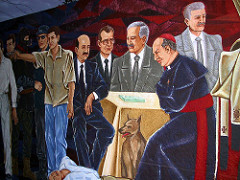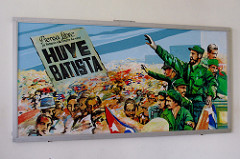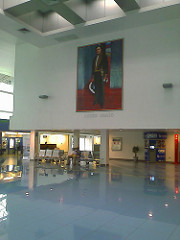Ch. 32 AP World History (Latin America: Revolutions and Reaction into the 2st Century) – Flashcards
Unlock all answers in this set
Unlock answersquestion
Fidel Castro
answer
Cuban revolutionary leader who overthrew the corrupt regime of the dictator Fulgencio Batista in 1959 and soon after established a Communist state. He was prime minister of Cuba from 1959 to 1976 and has been president of the government and First Secretary of the Communist Party since 1976.
question
Vicente Fox

answer
Became president of Mexico in 2000 and ended the PRI's reign; Pushed to end official corruption, reduce poverty, and spur economic growth; Tried to protect the rights of Mexico's natives;
question
PRI

answer
Party of the Institutionalized Revolution; dominant political party in Mexico; developed during the 1920s and 1930s; incorporated labor, peasant, military, and middle-class sectors; controlled other political organizations in Mexico.
question
Zapatistas
answer
Guerilla movement named in honor of Emiliano Zapata; originated in 1994 in Mexico's southern state of Chiapas; government responded with a combination of repression and negotiation.
question
National Action Party (PAN)

answer
A conservative and Christian democratic party and one of the three main political parties in Mexico. Since 2007, the party is led by Germán Martínez Cázares. Since 2000, the President of Mexico has been a member of this party
question
NAFTA
answer
A trade agreement between Canada, the United States and Mexico that encourages free trade between these North American countries.
question
GATT
answer
General Agreement on Tariffs and Trade; international trade organization ehtat encourages free trade by lowering tariffs and other trade restrictions
question
Juan Jose Arevalo
answer
Elected president of Guatemala in 1944; began series of socialist reforms including land reform; nationalist program directed against foreign-owned companies such as United Fruit Company
question
United Fruit Company
answer
Most important foreign economic concern in Guatemala during the 20th century; attempted land reform aimed at United Fruit caused U.S. intervention in Guatemalan politics leading to ouster of reform government in 1954
question
Fulgencio Batista

answer
Opressive dictator of Cuba from 1934 to 1944; returned to presidency in 1952; ousted from government by revolution led by Fidel Castro. Marred by corruption
question
Ernesto "Che" Guevara

answer
Argentine revolutionary; aided Fidel Castro in overthrow of Fulgencio Batista; died while directing guerrilla movement in Bolivia in 1967. (p 785)
question
Liberation Theology
answer
Combined Catholic theology and Socialist principles in effort to bring about improved conditions for the poor in Latin America (20th century).
question
Allende Salvador
answer
President of Chile; nationalized industries and banks; sponsored peasant and worker expropriations of lands and foreign-owned factories; overthrown in 1973 by revolt of Chilean military with the support of the United States.
question
Sandinista Party
answer
Nicaraguan Socialist movement named after Augusto Sandino; successfully carried out a Socialist revolution in Nicaragua during the 1980s. (p. 824)
question
Augusto Sandino

answer
He was a nationalist leader who fought against the U.S. Marines in Nicaragua. He led an army of peasants and Indians to restore Nicaraguan national sovereignty; rediscovered the guerilla tradition, been influenced by the anti-yankees and socialist ideas of the Mexican revolution, returned to Nicaragua.
question
Banana Republics
answer
Term given to governments supported or created by the United States in Central America; believed to be either corrupt or subservient to U.S. interests.
question
Good Neighbor Policy
answer
Franklin D. Roosevelt policy in which the U.S. pledged that the U.S. would no longer intervene in the internal affairs of Latin American countries. This reversed Teddy Roosevelt's Big Stick Policy.
question
Alliance for Progress
answer
Begun in 1961 by the United States to develop Latin America as an alternative to radical political solutions; enjoyed only limited success; failure of development programs led to renewal of direct intervention



